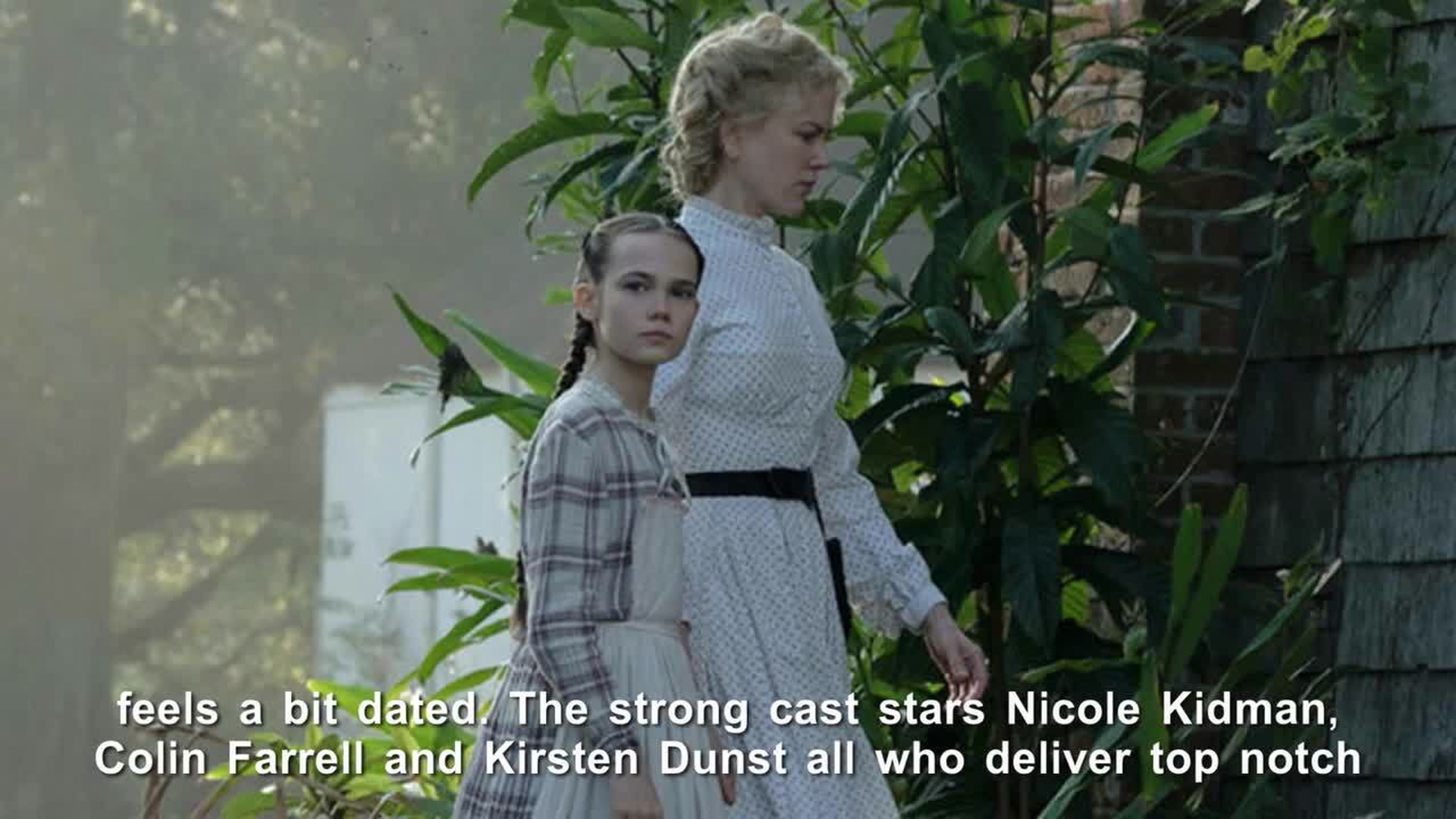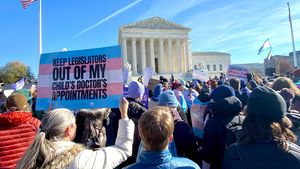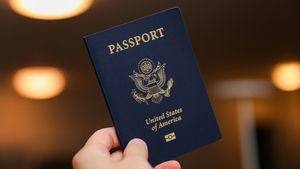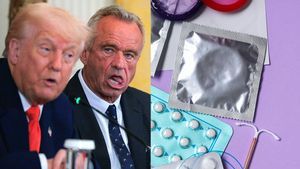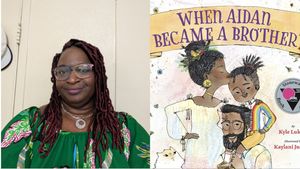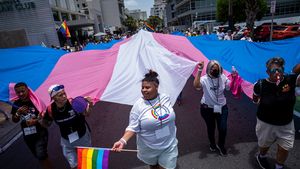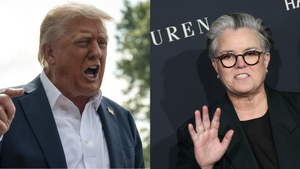Provincetown, Massachusetts is an enchanting haven for drag shows, seafood, cruising and people watching, all conducted in an extremely LGBTQ friendly setting that also dares to bring in lots of straights. I adore the place, and when you add the Provincetown Film Festival to the package, it's even more steamily desirable. I went last week to sample some diverse film-related events, and can report on some of them, along with some featured films which I snuck a peek at in New York. LGBTQ notables were everywhere--I chatted with Tony Kushner and hung with Andrew Sullivan--and I came back with a cinematic sense of appreciation for a sumptuous summer resort that's always a high definition.
WHEN YOU BEGUILE THE BEGUILED
"Handsome men, repressed sex, violence... everything I yearned for as a child," chirped John Waters wryly as he raved about Sofia Coppola's new film The Beguiled, while chatting with her at Ptown's Fisherman Hall in a presentation designed to give her the festival's Filmmaker on the Edge award. Coppola had just won Best Director at Cannes for the film (based on the old novel and movie about Civil War women who take in an injured enemy soldier) and revealed that she found out about the honor when she was taking a subway to Coney Island with her kids. (Pretentious she's not). Discussing The Beguiled with Waters, Coppola said she cast the handsome Colin Farrell as a nod to both women and gays. (Waters said Farrell doesn't like him because of a poppers joke the director made about the actor, who had already sobered up at that point).
Related | 3 Reasons the #VengefulBitches of The Beguiled Are Your New #SquadGoals
"Is Kirsten Dunst your Divine?" Waters asked Coppola, equating another Beguiled star with the late drag queen who centered Waters' most notorious films. "Yeah, she's my alter ego," she replied. "That's nice," she added, after musing on the comparison. "I'm gonna tell her that." Waters said the women in the film seem to be having "the vapors" over Colin and asked Coppola who she might have felt that way about. She responded that she had a huge crush on rocker Joe Strummer, who was once in the vicinity, definitely leading to the vapors. Waters volunteered that Amy Locane fainted on the first day of rehearsing Cry-Baby, when she was set to make out with Johnny Depp.
In other gossip tidbits, it was revealed that Waters became a minister in order to marry Depp and Winona Ryder, but he ended up convincing them not to get married (one of many good things he's done for the world). Also, Coppola isn't thrilled with the too-revealing trailer for her movie, saying, "You can't say, 'Darth Vader's his father' in the trailer!'" In other revelations about movieland machinations, Coppola backed out of directing a live action Little Mermaid because it was too corporate a project ("So many opinions") and Waters said his proposal for a Hairspray 2 was rejected by HBO. Lots of other stuff was discussed--including the fact that Coppola's famous parents raised her and her siblings away from Hollywood, in order to normalize their upbringing--and the result was a fabulous chat between two of my favorite film industry groundbreakers.
Also featured in the Ptown festival, After Louie is essential queer cinema, about a man clinging to his old rages and challenges as he reluctantly tries to adapt to the freer world he helped create. Alan Cumming plays an artist named Sam who, years after the AIDS death of his lover William (David Drake), is documenting him and the whole ACT UP era via a video project that he obviously finds cathartic. At a bar, Sam meets a younger guy named Braeden (Zachary Booth), who is in an open relationship and gladly sleeps with Sam (and accepts money), while exchanging intergenerational ideas with him about love and sex. Still remembering a time when he went to two funerals a week, and when he had to desperately fight in the street for attention to AIDS, Sam flies into a rage at friends of his (Wilson Cruz and Patrick Breen) who are getting married, considering it a bourgeois sellout that's too straight for words.
The thrust of the film--written by Vincent Gagliostro (who directed) and Anthony Johnston, from a memoir by William Wilson--has Sam finally burying the past and accepting the fact that he should be happy for gays who can marry and who are less hysterical about AIDS than his generation was thanks to the vast advances made. (And besides, with his constant smoking and drinking, he's the last one who should be chiding others about health issues. The man is a huge ball of contradictions, but likable nonetheless). With Braeden's help, Sam learns to stop punishing younger guys for not having had to go through the horrors that he survived. He even works out his issues by painting in red on the wall the names of people who we lost, mostly to AIDS, which seems to be a nod to the powerful projections of the dead people's names in the 2011 Broadway revival of The Normal Heart. (That's not surprising, since Larry Kramer helped consult Gagliostro on the screenplay. Martin Sherman would also like this film; his recent play Gently Down The Stream dealt with similar issues involving the divide between mature and emerging gays).
The performances are all terrific--Cumming and Booth anchor it, plus there's Justin Vivian Bond as a snooty art dealer, Everett Quinton as a happy older gay teacher, and Joey Arias singing in drag--and the result recaptures the spunky spirit of the activist '80s when, as Sam says, "there used to be such a brotherhood," if only for the ghastly reason that everyone around us was dying. It's a solid character study (I had seen it at a special screening in NYC), and only falters when it takes too long to wind down.

Susanne Bartsch: On Top
Also in Ptown: Susanne Bartsch: On Top, by Anthony&Alex, is a documentary about the long-running NYC party queen, a Swiss Miss who leads a conga line of every social strata and sexuality under the sun, bubbling up twice as fiercely whenever nightlife is under fire. Bartsch is also a shrewd businessperson who, as she's dancing atop a bar in a feathered headdress, is always thinking, "Why aren't there more people here?" (But it's always filled to the rafters. Bartsch's constant self doubt is one of her charming features).
The film is beautifully photographed, with lots of great archival footage, including her AIDS benefits called the Love Ball, which brought together the fashion world (and me) to raise funds. Bartsch talks about her father's double life, ex-husband David Barton is shown mentioning having battled addiction, and their son Bailey is very lucid, talking about how his mother basically plays a character at clubs, at other times is full of warm, maternal advice, and at yet other times doesn't connect at all. (Especially priceless is the home movie of little Bailey as a mermaid, splashing around the tub. His parents' liberalism clearly helped form him as a fabulous adult). A lot of the dark stuff is not mentioned--like the suicide of Susanne's assistant/nanny the Baroness, who had AIDS; recent tragedies involving a couple of her promoters, plus a feud or two that would have been interesting to probe--but the film captures the mood and accomplishments of a uniquely satisfying woman.
(Disclaimer: I'm in it, having followed her nightlife career, and I moderated a Q&A with the filmmakers after one of the Provincetown Film Festival screenings.) By the way, buzz in Ptown was that Aquaria--whom I've seen perform at Bartsch parties--tried out for Drag Race season 10, and seems to be a perfect choice.
DINA, IT'S ONLY THE BEGINNING
At Provincetown's Crown & Anchor cabaret, I caught up with Dina Martina, the surreal drag persona who concocts her own language (hard and soft g's are interchanged) while basically reinventing the drag wheel thanks to a self-admitted lack of "themes, substance, or continuity." Telling hilariously bizarre stories of holidays with her adopted daughter, Dina wears bold fashion choices and altogether too much makeup as she talks about her beef cleanse, her affinity for "distressed pork" and shots consisting of tequila and chicken bouillon, and her certainty that Angela (pronounced weirdly) Lansbury is dead.
Dina also serves delightfully twisted versions of pop classics like "I Wanna Dance With Somebody" and "Girls on Film," gargling-sounding renditions which will make it difficult for you to ever hear the originals again without twitching. While she changes into yet another forward-facing ensemble, Dina shows a video of her dining with a friend, Doreen (played by someone with a mask), who's the heiress to the Kotex fortune and has a "female penis," interestingly enough. The video--in two parts--gets more and more out there to the point where it definitely challenges your ideas of what is funny and/or creepy. Brava, Dina. What an intoxicatingly surprising antidote to all those suffocatingly perfect drag queens out there.





